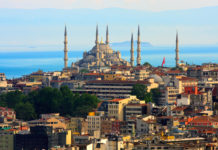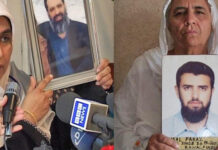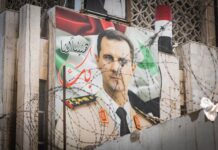This week on Speakers’ Corner, Ibrahim Hewitt asks: “What does ‘Britishness’ actually mean?”
In the recent flurry of articles about Remembrance Day and “should we” or “shouldn’t we” wear poppies and the “poppy hijab”, I read that perhaps we Muslims are trying too hard to prove our “Britishness”. It’s an interesting thought. For every action there’s an equal and opposite reaction, so when there is so much negativity about Muslims in this country we shouldn’t be too surprised if some of us try a little too hard to counteract it.
That was my first response to the matter. Then I thought – hold on, I am British, through and through – I don’t have to prove anything about my Britishness to anyone. For the record, my brother has traced my late father’s family back to 1815 in Somerset and 1809 in Glasgow (even further, though no date, for my Great-Great-Great-Great Grandmother, born in Fife). On Mum’s side, the records go back to 1813 in central Northumberland. There is no doubt that I am British to the core.
Religious dissent
What’s more, the very fact that I am British, English, a Geordie and a Muslim is very British indeed, for religious dissent has been a fundamental part of British life for centuries.
Think Protestants protesting (hence the name) against abuses by the Roman Catholic Church in the 16th century.
Think Catholics facing religious discrimination big time post-Gunpowder Plot until the 19th century and the so-called Catholic Emancipation.
Subscribe to our newsletter and stay updated on the latest news and updates from around the Muslim world!
Think the non-conformist Churches that sprang up in the late 17th century in dissent against the established Church of England.

Think Abdullah Quilliam in the 19th century and even earlier English converts to Islam.
Think Lord Headley embracing the faith in 1913 and any number following his example by becoming Muslims from the mid- to late-20th century up to the present day.
Being a Muslim is the ultimate (and very logical) religious dissent in a country claiming a monotheistic heritage. Moreover, being different is a very British thing to be.
What is “Britishness?”
But what is “Britishness”? Is there more to it than simply holding a British passport? I think there is. It was Tony Blair after the 7/7 London bombings who wanted everyone (for which read Muslims) to know what it means to be “British”. So-called “traditional and shared values” were to be imparted and we will all live happily ever after. Or so it was thought…
It is hard to adopt values if nobody has defined them clearly, although earlier this year Prime Minister David Cameron suggested that they include “freedom, tolerance, respect for the rule of law, belief in personal and social responsibility and respect for British institutions”. Looked at one by one I would argue that British Muslims are very British indeed; more so I would say, than many of our detractors.
Take freedom for example; most Muslims I know love being British precisely because we have so much more freedom to practice our faith in this country than our fellow Muslims in the so-called “Muslim countries”. That could well be because of Britain’s and other Western countries’ interference in those countries in pursuit of “our interests”, but divide and rule is something that we Brits do well. If there was a World Cup in it, I am sure we’d win! Sorry, a bit flippant, I know, but that’s a British characteristic that we are also good at – droll humour and the ability to mock ourselves.
 How about tolerance? On a theological level, Islam is more tolerant of other faiths and beliefs than, say, Christianity and Judaism, the supposed bases of Britain’s “Judeo-Christian heritage” thrown at us all too often. There is room for the “People of the Book” and others within an Islamic framework. Knowledgeable Muslims are well aware of this and generally act accordingly.
How about tolerance? On a theological level, Islam is more tolerant of other faiths and beliefs than, say, Christianity and Judaism, the supposed bases of Britain’s “Judeo-Christian heritage” thrown at us all too often. There is room for the “People of the Book” and others within an Islamic framework. Knowledgeable Muslims are well aware of this and generally act accordingly.
I haven’t seen any recent statistics, but until not so very long ago Muslims were applauded as one of the most law-abiding communities in the country, which pre-supposes “respect for the rule of law”.
Belief in our accountability on the Day of Judgement is a fundamental aspect of being a Muslim, so who can be more aware of “personal and social responsibility”? And anyone who has seen the respect afforded to Muslim JPs, MPs, Peers, knights of the realm and others in positions of responsibility within the Establishment by their fellow Muslims cannot, surely, believe that as a community we have no respect for British institutions.
Perhaps David Cameron should remember this the next time that he shows utter disrespect for British institutions by announcing a major policy initiative to the Australian parliament instead of his fellow MPs at Westminster.
Does “Britishness” mean “Englishness”?
We may well have something to say about the people who run the institutions — political dissent is also a fundamental British value — but if we express it we are, in doing so, being very British. Muslims should not be condemned, therefore, for giving voice to our profound dissatisfaction with British foreign policy which is having such a negative impact on the Muslim world.

According to the “English rebel”[1] George Orwell, British characteristics include: “law-abiding, considerate, gentle, decent, patriotic, insular, private, anti-intellectual, sentimental, given to compromise and class-ridden… lovers of home, garden, sport and animals.”[2] In simple terms, though, identity in the British context reflects the complexity of the nation and the diversity of the people living in Britain. The matter is complicated further by the fact that “Britishness… [is] often a smokescreen for Englishness”.[3]
In his classic Ecclesiastical History of the English People, the Venerable Bede (a fellow native of the North East of England) wrote: “At the present time [late 7th, early 8th century] there are in Britain… five languages and four nations – English, British, Irish and Picts.”[4] Bede is clearly talking about Britain as a geographical fact, not a nation, so if there is a single British national identity, an awful lot has happened in the intervening years between Bede and the present day.
Kearney describes Bede’s “four nations” as “four cultures”, substituting “Anglo-Saxon” for “English”,[5] in a “Britannic melting pot”.[6] The labels may have changed, but the metaphor remains apt, for Britain today is a complex mix of nations, ethnic groups, languages, customs, cultures and identities.
What begins to become clear when you look into these matters is that diversity has been a feature of life in the British Isles for a lot longer than government ministers, neo-conservatives and neo-fascists alike would like us to believe.
It is also worth noting at this point that less than 50 years after the death of Bede, Muslim traders were visiting the shores of Britain in sufficient numbers to make it worthwhile for King Offa of Mercia (one of the major Anglo-Saxon kingdoms) to mint a gold coin which was a copy of those circulating in the Muslim world at that time (Arabic script and all) in order, it is believed, to encourage trade. This is of particular importance given the attempts to “integrate” Muslims into British society and the preoccupation of the government with Islam and Muslims.
“Britishness” and “whiteness”
In fact, this is where we begin to see one of the paradoxes of efforts to create the one-size-fits-all British values, for although it has been acknowledged that we live in “multi-ethnic Britain”[7] doubts are expressed about Britain as a multi-ethnic nation.

The rise of the political right illustrates the public expression of such sentiments although the notion of “white superiority” is not new, of course. Michael Banton placed the highest level of such a view in the decades preceding the First World War, when European imperialism was at its peak: Britain’s then Secretary of State for the Colonies, Joseph Chamberlain, proclaimed that “the British race [sic] is the greatest governing race the world has ever seen.”[8]
Although Banton argued that Chamberlain and his ilk “probably regarded race as a synonym for nation” it is still accepted that Britons then (and now) had a sense of superiority over the non-whites they ruled which nationhood alone cannot explain away. According to Dodd, by the 1980s, the “equation of Britishness and whiteness”[9] was again being nourished in earnest, although in truth it had probably never really been undernourished.
From race to religion
In the early years of the 21st Century, the focus has shifted from race to a new enemy within and without Britain’s borders; so-called radical Islam. This has spawned a plethora of alternative names as politicians and commentators vie with each other to go on the attack without offending supposedly “moderate” Muslims.
Hence, we have “Islamism”, “jihadis” and so on imposed on the discourse. “Moderate” Muslims are promoted by the government; they’re safe because “they’re the Muslims you can’t see; they don’t take their religion seriously enough to be seen”; not my words, but those of a veteran non-Muslim, anti-racism campaigner and educationist at a seminar in Oxford in May 2014.

Although not an identity in itself, culture as an expression of identity can provide insights into what it means to be British today. In the late Victorian-Edwardian period running up to World War One, it is reasonable to say that for British culture you should read English culture. For sure, the Scots, Welsh and Irish had made important contributions to the rise of the British Empire, but in the popular mindset, the image of Britain was Home Counties England.
Peter Taylor places the English homeland in the “geographically limited Home Counties”. Furthermore, he says that London is a “City-state for which the rest of England and Britain has little purpose or function”.[10]
There has been serious discussion about whether or not London “needs” the rest of the UK. I know a few Muslims who think the same way. This is a narrower version of Matthew Arnold’s implication that Scottish, Welsh and Irish cultures within Great Britain have a “peripheral relationship” with the “English core”.[11]
There is an important public debate waiting to be had about identity and belonging in this country. It is a complex issue and probably without any easy answers. On the face of it, though, British Muslims don’t need to make any extra effort to prove our Britishness; we’re arguably more British in many ways than those who claim Britishness as their exclusive birthright purely by dint of the colour of their skin.
Whether or not such a debate can be had within an atmosphere reflecting the British values of tolerance and respect for the rule of law remains to be seen. In the meantime, British Muslims shouldn’t fret about proving their British credentials to anyone.
Take it from me, we’re British. End of.
Ibrahim Hewitt is the Senior Editor of Middle East Monitor and the Chair of UK-based charity Interpal.
You can follow Ibrahim Hewitt on @ibrahimhewitt56
Notes
1. Robert Colls, George Orwell – English Rebel, Oxford University Press, 2013.
2. George Orwell, quoted in Jeffrey Richards, Films and British national identity: from Dickens to Dad’s Army, Manchester University Press, 1997, p14.
3. Philip Dodd, The Battle over Britain, Demos, 1995, p44.
4. Bede, Ecclesiastical History of the English People, Penguin, 1990, p45.
5. Hugh Kearney, The British Isles – A history of four nations, Cambridge University Press, 1989, p35
6. Ibid., p5.
7. See, for example, Challenge, Change and Opportunity; the future of multi-ethnic Britain, the report on a conference held at the University of Reading, September 1994, The Runnymede Trust, 1995.
8. Michael Banton, Racial Theories, Cambridge University Press, 1994, p76.
9. Dodd, 1995, p41.
10. Peter J Taylor, The English and the Englishness: “a curiously mysterious, elusive and little understood people” in Scottish geographical Magazine, vol. 107, no. 3, 1991, p147.
11. Philip Dodd, Englishness and the National Culture, in Colls and Dodd, eds., Englishness: Politics and Culture 1880-1920, Croom Helm, 1986, p12.










![24 Hour Road Trip Through Free Syria [Short Film]](https://5pillarsuk.com/wp-content/uploads/2025/02/IMG_5907-218x150.jpg)











